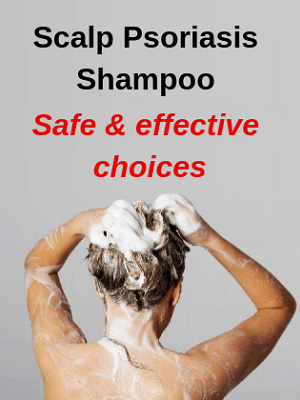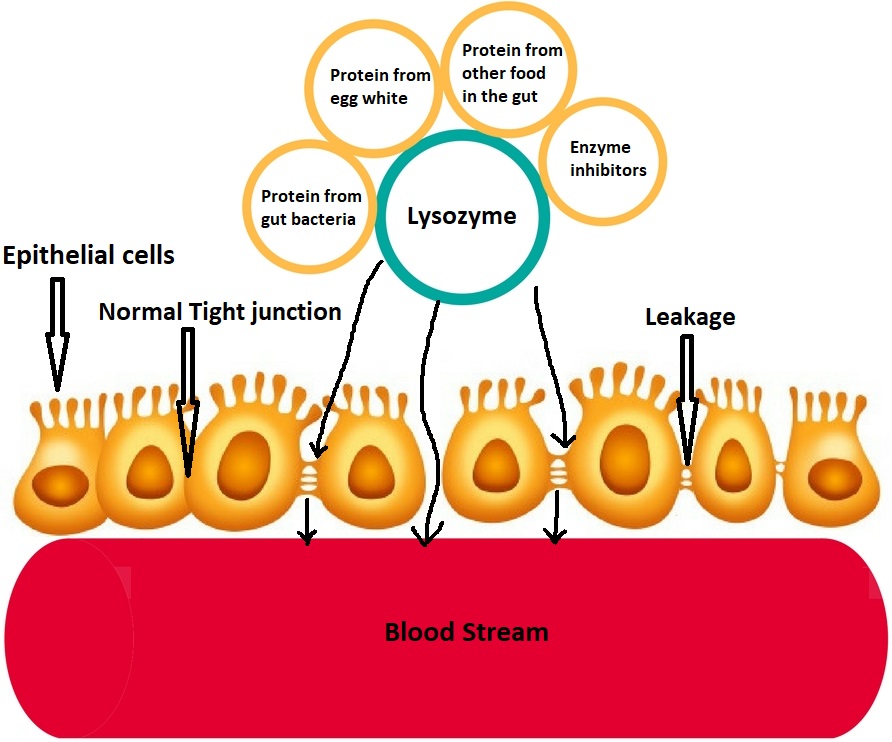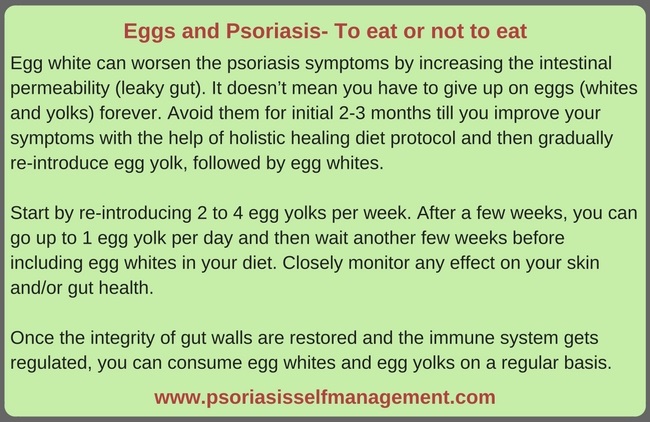Eggs make one of the most popular forms of animal protein in the human diet- easily available, affordable and taste good. Eggs are an important staple food for people around the world- as a breakfast food (omelette) and as a key ingredient in many baking recipes. But, when it comes to autoimmune disorders including psoriasis, it is better to stay away from eggs till you improve your skin health significantly with the help of psoriasis diet protocol. Once you feel satisfied with the improvement in your skin and gut health, gradually re-introduce egg yolks- not more than 2 to 4 egg yolks per week and closely monitor the effect on skin. After another few weeks, you may re-introduce egg whites, but, in limited amounts with caution. If notice any gut issues like bloating, inflammation, gas, constipation or detrimental effect on skin, simply avoid them.
According to Dr John Pagano, author of the book Healing Psoriasis: The Natural Alternative, 2-4 eggs (whites and yolks) per week are permissible.
Eggs are incredibly nutritious
Egg is a nutrient-dense food; low in calories and high in protein and vital nutrients. It provides 13 essential nutrients- vitamins, minerals, essential omega 3 and omega 6 fatty acids, choline and antioxidants.
The egg whites (white portion of the egg) mainly provide protein and the yolk provides fat and cholesterol. The egg yolk of one large sized egg can provide around 186 mg (62% of daily requirement) of the cholesterol requirement of an adult person’s diet.
The American Heart Association (AHA) recommends not to go beyond 1 egg per day for healthy adults with a total cholesterol limit of 300 mg per day to prevent heart conditions.
That’s why, many times, people would just eat egg whites and throw away the yolk fearing excess of fat and cholesterol. Unfortunately, they miss the actual nutrient dense part of the egg because most of the 13 vital nutrients are contained in egg yolk only.
Also, the detrimental effect of egg yolk’s cholesterol is minimal as compared to saturated fats and trans fats. A review published by the Department of Nutritional Sciences, University of Connecticut, USA indicates that dietary cholesterol (from eggs) doesn’t have any serious effect on the blood cholesterol level for majority of the population. Many recent studies have observed that eating up to 2 egg yolks per day doesn’t increase the risk of heart problems in the general population, however, people already dealing with serious heart issues should consult their doctors before consuming egg yolks in liberal amounts.
Nutritional content – Egg white vs Egg yolk
Serving size: 1 large egg (50 grams of edible egg)
| Nutrient | Egg white | Egg yolk |
|---|---|---|
| Protein (gm) | 3.6 | 2.7 |
| Fat (gm) | 0.05 | 4.5 |
| Vitamin A (IU) | 0 | 245 |
| Vitamin D (IU) | 0 | 18.3 |
| Vitamin E (mg) | 0 | 0.684 |
| Vitamin K (IU) | 0 | 0.119 |
| Vitamin B1 (mg) | 0.01 | 0.03 |
| Vitamin B2 (mg) | 0.145 | 0.09 |
| Vitamin B3 (mg) | 0.035 | 0.004 |
| Vitamin B5 (mg) | 0.63 | 0.51 |
| Vitamin B6 (mg) | 0.002 | 0.059 |
| Vitamin B9 (mcg) | 1.3 | 24.8 |
| Vitamin B12 (mcg) | 0.03 | 0.331 |
| Calcium (mg) | 2.3 | 21.9 |
| Magnesium (mg) | 3.6 | 0.85 |
| Iron (mg) | 0.03 | 0.4 |
| Phosphorus (mg) | 5 | 66.3 |
| Potassium (mg) | 53.8 | 18.5 |
| Sodium (mg) | 54.8 | 8.2 |
| Zinc (mg) | 0.01 | 0.4 |
| Copper (mg) | 0.008 | 0.013 |
| Manganese (mg) | 0.004 | 0.009 |
| Selenium (mcg) | 6.6 | 9.5 |
| Omega 3 fats (mg) | 0 | 37 |
| Omega 6 fats (mg) | 0 | 574 |
| Cartenoids (antioxidants) mcg | 0 | 21 |
| Choline (mg) | 0 | 126 |
- As per the above table, majority of the nutrients- vitamins, minerals and micro nutrients- are found in egg yolk.
- Carotenoids are pigments which impart the yellow color to the yolk and possesses antioxidant activity.
- Choline is a vitamin-like essential nutrient which helps in normal cell activity, liver functioning, brain development and transportation of other essential nutrients throughout the body.
Importance of diet in holistic healing of Psoriasis
Psoriasis is an autoimmune skin issue- the uncontrolled, faulty immune system stimulates exponential growth of skin cells that results in psoriasis lesions on various parts of the body. Other symptoms of psoriasis are severe skin dryness, inflammation and itching.
The exact cause for such a furious immune system are not known yet, but, the list of possible causes includes poor gut health, faulty genes, chronic stress, infection, skin injury, over consumption of antibiotics and certain medications, poor eating habits and disturbed lifestyle.
One or more of the causes, as applicable in your case, leads to the root of the issue- leaky gut. Leaky gut, aka leakage in the gut walls refers to hyper-permeability of gut walls which allows the toxins (undigested food, disease causing microbes, heavy metals, pesticides and other metabolic wastes in your gut) to seep through the walls and enter the blood stream and circulate throughout the whole body. In the ideal situation, these toxins are meant to be flushed out of your body via stool, urine, sweating and breathing out. The immune system is your body’s defense system and it takes these toxic particles as a serious threat and as a counterattack, it becomes hyperactive and trigger an autoimmune response in the form of rapid growth of skin cells and inflammation.
The holistic healing of psoriasis aims to reverse the scenario- body detoxification to flush out the accumulated toxins followed by healthy diet and lifestyle to ensure that toxins doesn’t accumulate any more. At the same time, strengthen the gut health with the of probiotics, dietary supplements (omega 3 fats, vitamin D, turmeric, milk thistle) and digestive aids. And, of course, how can you forget stress! Stress management with the help of yoga, meditation, exercise and other relaxation techniques is an integral part of the holistic healing approach.
A healthy, nutritious and restricted diet is the most important aspect to heal psoriasis from within. It includes eliminating all the common food allergens (nightshades, gluten, dairy, red meat) from your diet. Highly processed, refined products such as junk foods made from refined white flour and rich in sugar, salt and saturated fats are also prohibited. Consume more of fresh vegetables, fruits, brown rice, olive oil, virgin coconut oil, fish and skinless white meat. These foods are healing, nourishing and easy to process- doesn’t put a load of burden on your digestive system. Probiotic-rich stuffs like yogurt, buttermilk, kefir and fermented vegetables are also beneficial.
Once you start the psoriasis healing diet protocol, it takes around 10-12 weeks to experience significant improvement in the skin condition if other rules of holistic healing protocol are also followed properly- healthy lifestyle, dietary supplements, regular workout and stress management. The deciding factor is- when your body is free from the accumulated toxins and becomes capable enough to filter out the toxins on a daily basis by itself- then you can slowly re-introduce the food stuffs one by one.
What about eggs? Are eggs bad for Psoriasis?
Well, eggs come under the list of prohibited foods till your psoriasis improves. Then, you can slowly re-introduce egg yolks followed by egg whites.
Curious why I recommend to add egg yolks first and egg whites later? Read below to know yourself!
Egg whites
Egg white is a food allergen like dairy or gluten. The white portion of the eggs acts as a protective cover to safeguard yolk from various microbial attacks and foreign invaders. To perform this protective action, egg whites secrete an enzyme- lysozyme. When we ingest this enzyme, it connects with various proteins (protein from egg white itself + protein from other food in the gut + protein from gut bacteria) and enzyme inhibitors to form a bigger complex molecule. This complex molecule cannot be digested by the protease enzymes (enzymes that helps in protein digestion by breaking them down into amino acids) and hence, remains undigested in the gut.
Lysozyme has an interesting chemical property that it possesses a positive charge and hence, it is attracted to the negatively charged proteins in the epithelial cells that line the gut walls.
These epithelial cells are present at the wall of the small and large intestine, tightly connected to each other to form a tight barrier. In other words, these epithelial cells control the integrity of gut walls so that any unwanted stuff cannot pass through into the blood stream. Leaky gut occurs when this barrier gets damaged.
Due to the strong attraction between opposite charges of epithelial cells and lysozyme, the lysozyme and all the attached proteins cross over through the gut barrier into the blood stream (or lymphatic system). The immune system considers this large, undigested molecule as a foreign threat and trigger an auto-immune reaction to worsen psoriasis symptoms.
This trouble maker enzyme is resistant to heat (cooking/boiling) and highly acidic conditions (stomach acids in your gut). Hence, it would neither be destroyed during cooking nor during digestion.
We, the humans, also produce lysozyme as a part of our natural defense system against the harmful microbes. It is present in tears, saliva and mucus. Now, the question arises is- if we are already producing lysozyme, then why the lysozyme in egg white is a problem? Actually, it is the lysozyme itself, but the attached undigested proteins are the real culprits.
Egg yolk
If egg white poses so many threats to a compromised gut, it is quite difficult to claim that yolk is completely safe. People with leaky gut are tend to be sensitive to egg yolk also.
Also, egg yolk contains omega 6 fatty acids (see the nutritional chart above). Arachidonic acid, a type of omega 6 fatty acids, found in egg yolk is pro-inflammatory in nature- increases inflammation to worsen autoimmune response in the body. Apart from egg yolks, other major sources of arachidonic acid include red meat, dairy, poultry, burger, pizza, pasta, vegetable oils and junk foods. A small amount or arachidonic acid is required for proper functioning of liver, brain and other organs, but, when consumed in excess, can get converted into inflammation causing substances.
In short, egg yolk is also problematic, but, to a far lesser extent than egg whites.
A possible alternative to eggs
Many people eat egg omelette as a routine breakfast menu and it would not be easy for them to avoid eggs altogether for 2-3 months. But, we have to understand that egg being a food allergen, is one of the most obvious food stuffs to be eliminated from your diet.
You may try replacing eggs with white fish- you know, fish is another easy to digest animal protein, rich in omega 3 fats which helps to reduce inflammation and improve gut integrity. You can bake, broil, poach or grill them to improve the taste; avoid frying.
Which varieties of eggs are better
When you are about to re-introduce egg in your diet, try to consume organic, grass-fed eggs. The omega 3 eggs (chicken feed is fortified with flax seed, canola oil, bran, fish oil, vitamin E so that the eggs contain a high amount of omega 3 fatty acids) are also a good option. If you can’t find these varieties, then go for pasture raised, free range eggs. Try to avoid commercially raised eggs as they are quite high in arachidonic acid.
References
https://www.ncbi.nlm.nih.gov/pubmed/16340654
https://ndb.nal.usda.gov/ndb/foods/show/112
http://www.enc.org.au/position-statements/eggs-and-omega-3s/
https://en.wikipedia.org/wiki/Intestinal_epithelium
https://www.ncbi.nlm.nih.gov/pubmed/11897631
https://www.ncbi.nlm.nih.gov/pubmed/11906463




Thank u so much for the info sir since i’m still eating eggs but don’t know whether they are good or bad for pso. How about freshwater fish such as carp, catfish, so on…do they good for pso?